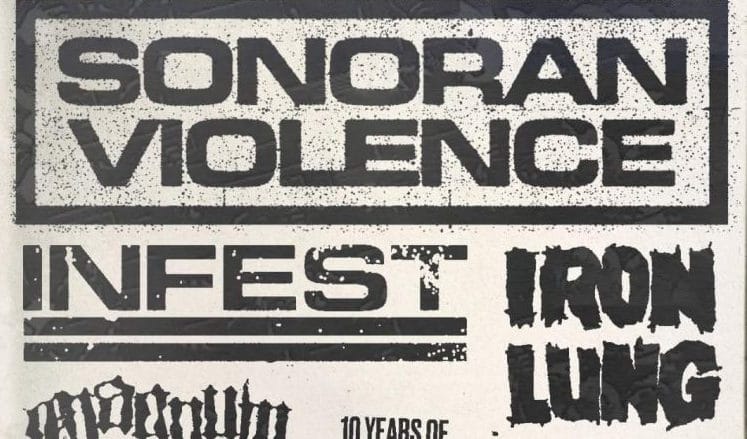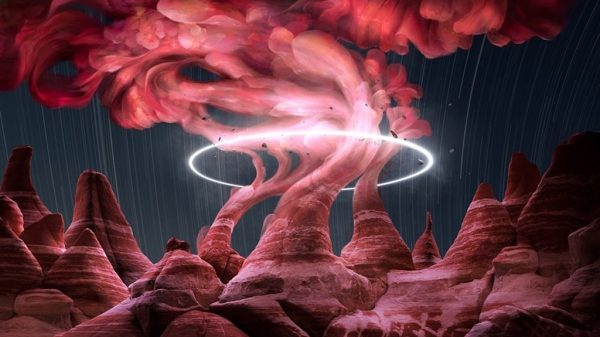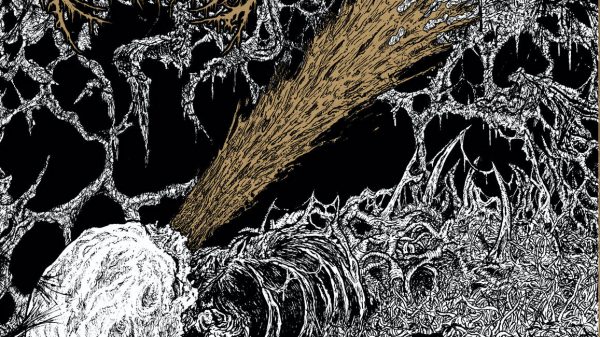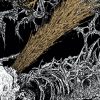Jirix-Mie Paz is an institution in the Arizona heavy music community. Having played in Goya, Gay Kiss, Burnout, Get Destroyed, Humiliation, and more, he is a musician of unquestionable pedigree. He is equally as qualified behind-the-scenes, running Paz House Recording, one of the most reputable studios in Arizona, particularly when it comes to hardcore and powerviolence. A man of apparently endless energy and talent, he is also the mastermind behind Sonoran Violence, which laid Tucson and Phoenix to waste on January 3rd and 4th. Shortly before the fest, Jirix-Mie found the time to talk to me about his many creative and community endeavors.
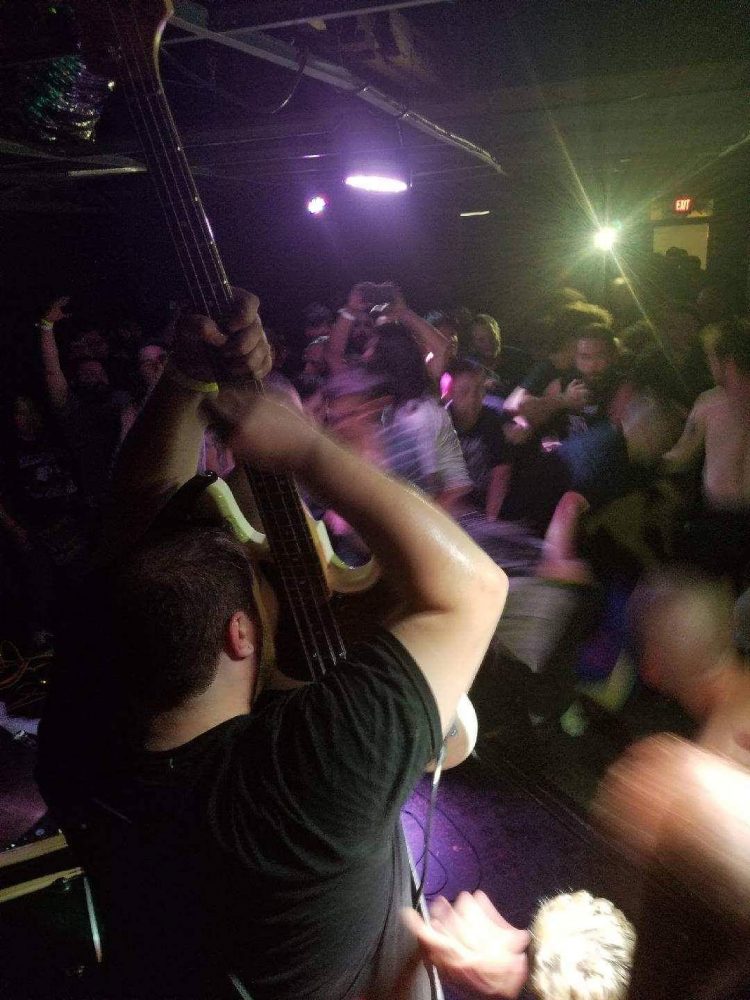
You have been an active musician for almost 20 years, especially in punk, hardcore, and metal bands, most of which are among the most important bands to come out of the Arizona scene. When did you add recording, producing, and mixing to your skill sets, and what inspired you to pursue studio work?
I picked up a bass guitar in 8th grade and fell in love immediately, and I wasted no time putting together a band and making noise in my parents’ garage. I am proud to say the cops were called on us immediately because my neighbor thought someone was getting murdered in the garage. She clearly didn’t understand the intricacies of high pitched screaming vocals. Fast forward a bit, and my bands had started hitting the studio to record songs, and I quickly became fascinated by that process. I was attracted to the combination of creativity and technicality, which is how my brain has always been wired. Recording in other people’s studios got expensive pretty quick, and I was never really happy with the outcome.
So in the DIY spirit, I decided I wanted to learn how to record my own bands and started taking it pretty seriously around the age of 18/19. I messed around with free recording software on my computer and started investing some money into microphones and analog preamps and figuring out that whole world. The learning curve is pretty steep, and it took me longer than I’d like to admit to really get a grasp on it. There are a lot more resources out there now, but 14 years ago, that was not the case, so it took a while to understand concepts like EQ, compression, gating, sidechaining, busses, sends, etc. There’s a lot to take in. I’ve been at it for about 14 years, and I only really feel like I’ve had a good grasp on it for the last few years, and I’m still learning every day. It was all a natural progression. I wanted to record myself so I had to learn how. People liked my bands’ recordings so they hit me up to do the same for them, and that’s how I got work, which made me better and better. I’m grateful to all the local punk and hardcore bands that let me record them, even when I barely knew what I was doing. Shout out to URBAN STRUGGLES who were the first band that let me record them that wasn’t my own band.
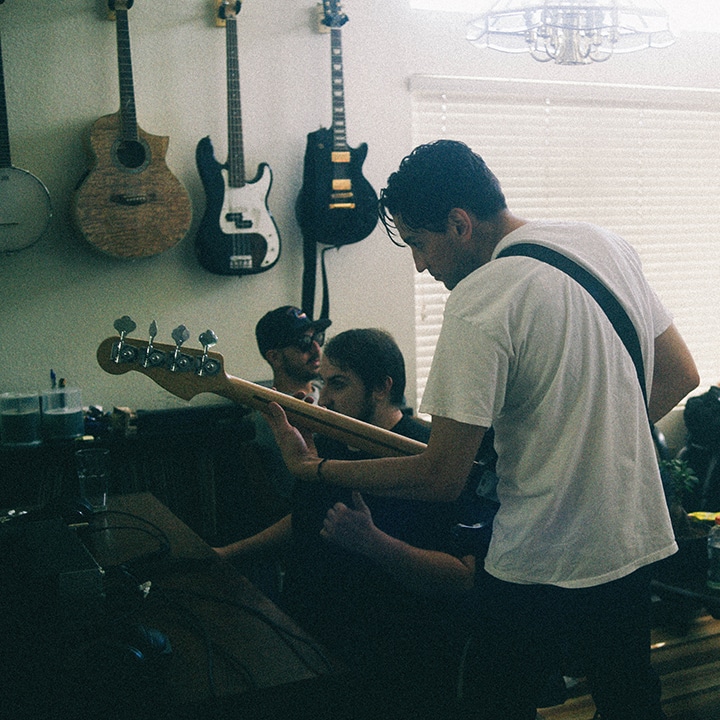
How do your talents as a musician translate into your production work? You have recorded most of your own bands, so your input is obviously creative with those projects, but how do you decide how much creative feedback to provide when recording another band?
The two worlds of recording and playing music are definitely intertwined for me. They influence each other, and I feel they make me better at both. I’ve become a better songwriter by understanding what works and doesn’t work in the studio, and I can communicate things to other band members a lot better because I can give good reasons why a part should sound a certain way. I’ve become a better producer by learning what tones and setups I like as a musician. When I record my own bands, I take a pretty heavy-handed approach, but I always want feedback from everyone involved. I think a collaborative process is more powerful than an individual one. When I record someone else’s band, I will ask them pretty early on if they want my opinion on things. Usually bands are up for it, and then I feel free to speak my mind and try to give creative input that will move things forward, and I always try to explain why so that I don’t come off as just an “I know better, trust me” kind of guy. I’d say about 90% of the time, people hear me out and take my advice and it works out well. I’m in a pretty niche category, so if people are hitting me up to record their bands, it’s likely they’re familiar with my work already and want my input on stuff. Sometimes bands wanna do their own thing and don’t want my input and I respect that, too.
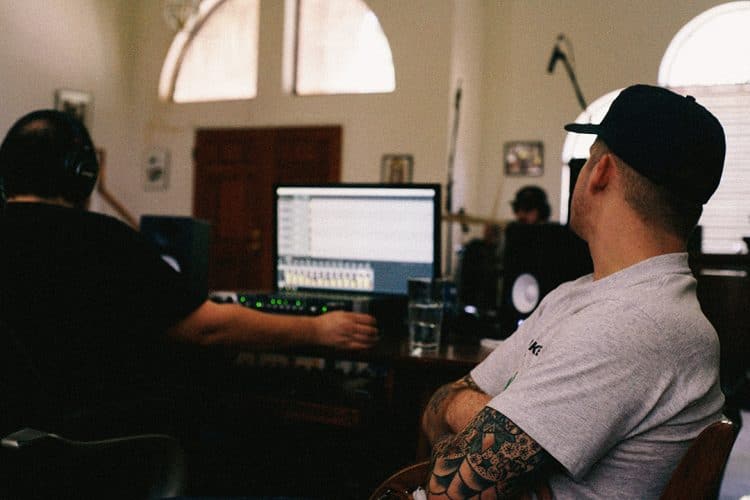
Paz House is a mobile recording studio. What are the benefits and obstacles of traveling and recording in different spaces? How do you adapt when recording in a totally new space?
I have a few spots that I like to record at. Mainly my house, my band’s practice space at 16 studios in Phoenix, or the warehouse formerly known as Wallstreet/Sound Kontrol, which now goes by Disco Inferno. The bulk of my work has been recorded at these 3 places and I’m grateful for that because they are familiar environments. I always suggest to bands that hit me up to use one of these places, and they almost always take me up on it. When I do travel to a new location, I size up the room and do a lot of test recording to get tones that will work. Sometimes it happens quickly, but sometimes we can take an entire day just setting up microphones and listening to them to get everything sounding right. There’s no secret formula; you just have to record and listen and gather opinions until everyone is happy. Most rooms can sound good in one way or another. The biggest obstacle is just the physical labor involved in packing up all my gear, moving it, setting up, tearing down, moving it again, etc. It’s taxing but it’s also a labor of love, so I can’t complain.
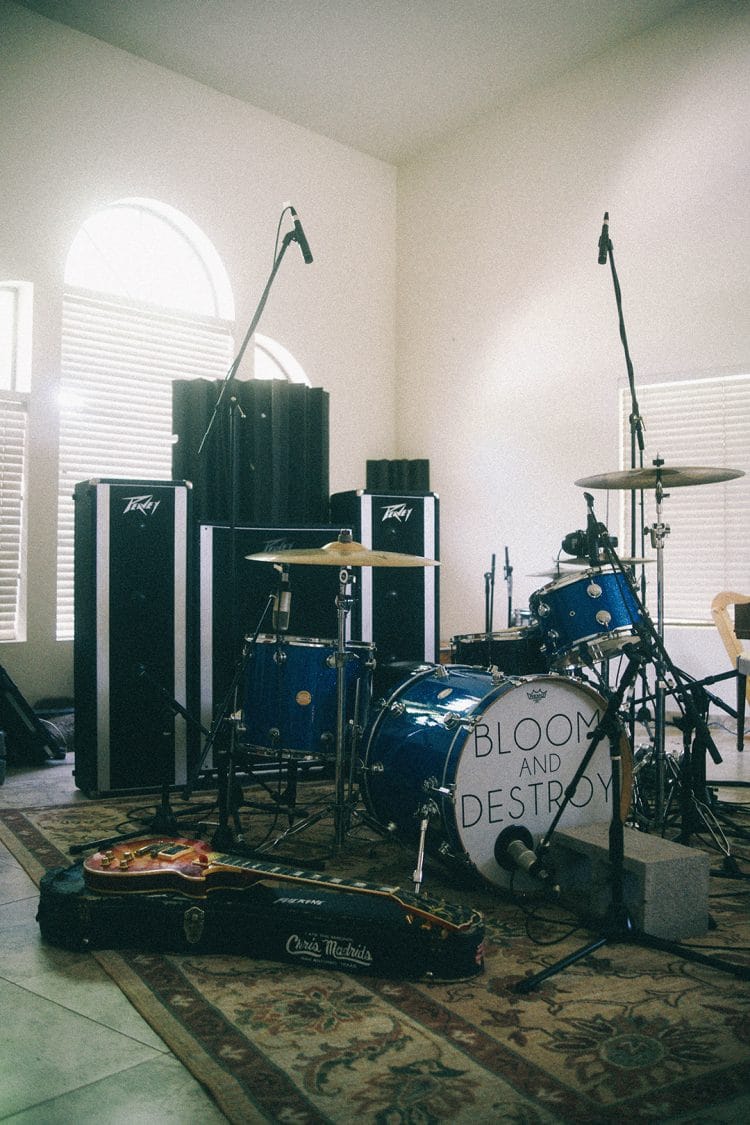
Though many of the bands you record fall under the umbrella of “heavy music,” they each have distinct sounds. How do you approach recording and mixing a band so that their unique qualities stand out while remaining true to their respective genre, be it doom, powerviolence, hardcore, etc.?
I think a lot of that comes down to getting things right from the start. I always like to spend a little extra time during set-up to make sure we get the right tones going in, because that will determine how things end up sounding in the mix. Getting it right at the source is huge. If you throw some mics on dead drum heads and shitty Crate guitar amps, then your recording will sound kinda shitty and flat. If we crank up my Marshall JCM 800 and run it through my Orange cab and pair that with new strings and new drum heads, the recording actually has a shot at sounding awesome right from the get-go with the raw tracks. The first few years of producing, I was just trying to make everything sound the absolute best that I could make it sound. I would try to reference similar albums to the genre and just use my ears to try and get as close as possible. For the most part, it worked. Sometimes it fell flat, but I learned a lot along the way. Now I’m at a point where I have a much better grasp of what I’m doing so I can be more creative on how to achieve a desired outcome.
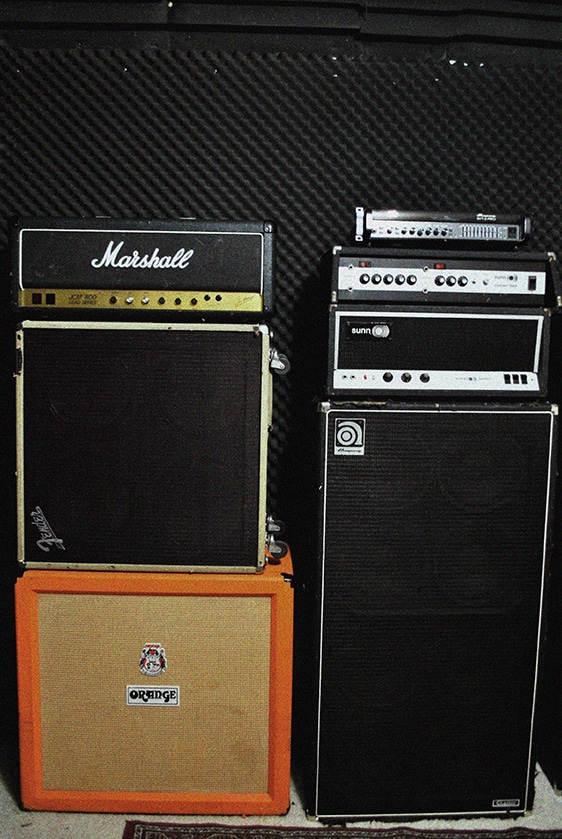
Would you say there is a “Paz House sound,” and if so, what defines it?
That’s a tough one. I honestly have no idea. If there is a Paz House sound, then it’s probably because I’ve been using the same equipment and recording in the same rooms for over 10 years now and using the same ears to mix. Most of the sound is due to that probably, because my mixing styles have changed a lot over the years. If I compare a record I did 10 years ago to a record I mixed last year, they sound totally different to me. At the same time, though, I’ve had people tell me they can tell when I recorded something, so there’s that.
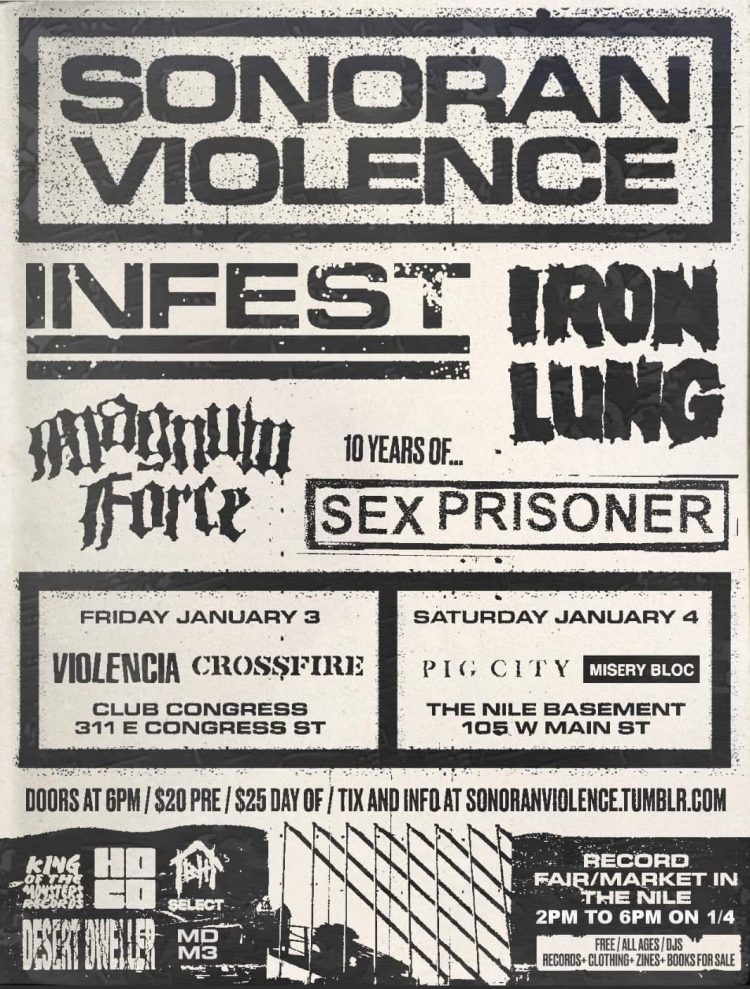
Arizona has been establishing a national reputation with music festivals such as FORM Arcosanti, Pot of Gold, HoCo Fest, Desert Dweller Fest, and the sadly defunct Southwest Terror Fest. What inspired you to start Sonoran Violence?
There’s been a smaller version of this happening in Phoenix almost every year around the holidays for quite some time now. My old band Get Destroyed would reunite once a year to play a show because we’d all be in town for the holidays, and it was always a rager. Some years we wouldn’t do it and people would hit me up asking why I’m not doing my holiday hardcore punk show. Well, now it’s become official. It’s basically just an excuse to put all my favorite bands together on one show. Infest wanted to play Arizona, so I offered to book them and then I heard Sex Prisoner was trying to book a 10-year anniversary show around the same time, so the idea was born out of that. It just came together thankfully, and then it was decided to make it a bigger thing. I teamed up with my friend Justin Keefer and a bunch of awesome Arizona people—like Matt Baquet from HOCO, Matt Marcum from Desert Dweller, and Mike Genz from King of the Monsters, Josh Rodriguez from Select Shows, and Matt Dobbins, who does MDM3 — to combine our resources into one big event. I hit up Iron Lung and they were stoked on the idea, and then Magnum Force agreed to reunite for it, so at that point it became a beast of a show. Another important element is a fundraising and awareness campaign that will be attached to it. In the past, I helped book the Gay Kiss last show, which ended up being a big fest with proceeds going to the International Rescue Committee, and then we did another big fest where the proceeds went to Planned Parenthood. This time around we are raising funds for the Florence Project, a non-profit that helps migrant detainees with legal funds. They’re one of the only Arizona organizations directly helping separated families, and they need all the help they can get. We will be printing some merch for sale at both shows with all profits going to them.
What were the greatest obstacles you faced in starting the festival?
It’s been pretty smooth sailing to be honest. You kind of just run into all the regular issues you do when booking any show, big or small. Can we find the right venue? Do the finances make sense? Will people give a shit about this? It’s definitely stressful, and if it falls flat then I have to hit up the ATM to pay the bands out of pocket. So that mental stress is by far the biggest obstacle, but that just comes with the territory of any show I book. I’ve lost money in the past, and I will surely lose money in the future supporting what I love, so it is what it is. Breaking even would be great!
Both days feature what many powerviolence fans would call “dream-come-true” lineups: Infest, Iron Lung, Sex Prisoner, ACxDC, and Magnum Force, as well as relative newcomers but total heavy-hitters Pig City, Violencia, Crossfire, Get a Grip, Concrete Evidence, and Röntgen . How did you decide which bands to feature? How has the fan reception been?
The response has been killer, which definitely helps alleviate some of the stress. The lineup worked itself out pretty quickly as I mentioned above. I’m friends with all of these bands, so there’s definitely a personal connection to the lineup. I’ve been booking Iron Lung shows in Arizona for over a decade now. Infest is one of my favorite bands. I had “Slave” on cassette tape in high school and it played non-stop in my car for a year straight. My old band Burnout had the chance to play a show with Infest, and we bonded with those guys immediately. Magnum Force are deep homies, and I’ve recorded some of their stuff and helped compile their discography on To Live A Lie. Sex Prisoner are one of my favorite bands, and I’ve known those dudes forever. Pig City are newcomers to the scene but they’re carrying the powerviolence torch, and they’re another band I’ve had the pleasure of recording. I met Violencia on a Burnout tour when we played San Diego, and we instantly became friends. I’ve since hung out with them multiple times in Mexico and California, and I’m stoked we could bring them out for this. Crossfire is another group of awesome people from Tucson that have been putting in the time and deserve the recognition. How crazy is it that I get to be friends with my favorite bands? I can’t believe I get to see them all 2 days in a row. What a fucking blast!
Are there plans to make Sonoran Violence an annual event? If so, and without revealing anything prematurely, do you have specific ideas for who might play next year?
Absolutely. We want to do this every year! I already have next year’s line up pretty much completely fleshed out. It’s gonna be fucking sick. You’ll see.

